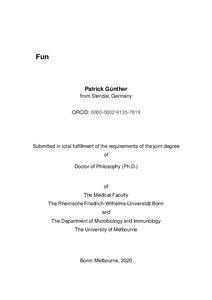Günther, Patrick: Functional and cellular heterogeneity of the myeloid cell system. - Bonn, 2020. - Dissertation, Rheinische Friedrich-Wilhelms-Universität Bonn, University of Melbourne.
Online-Ausgabe in bonndoc: https://nbn-resolving.org/urn:nbn:de:hbz:5-60280
Online-Ausgabe in bonndoc: https://nbn-resolving.org/urn:nbn:de:hbz:5-60280
@phdthesis{handle:20.500.11811/8763,
urn: https://nbn-resolving.org/urn:nbn:de:hbz:5-60280,
author = {{Patrick Günther}},
title = {Functional and cellular heterogeneity of the myeloid cell system},
school = {{Rheinische Friedrich-Wilhelms-Universität Bonn} and {University of Melbourne}},
year = 2020,
month = nov,
note = {Cells of the myeloid lineage form the innate part of the immune system and are characterized by a high level of functional plasticity, which is required to address the diverse set of functions of these mononuclear cells. Monocytes, Macrophages and dendritic cells (DC) are collectively categorized as the mononuclear phagocyte system (MPS), to highlight their functional equipment that specializes them to the phagocytosis of pathogens as a starting point to elicit an immune response. Besides this role, cells of the MPS are also involved in a wide variety of homeostatic functions including early development and regulation of physiological processes. However, the multitude of mechanisms required to acquire this functional plasticity remains poorly understood.
The work that has been performed in the scope of this dissertation aimed to advance current knowledge of the causes and consequences of functional and cellular plasticity of the myeloid immune system. High-dimensional characterization of the effects of a Western diet on myeloid immune cell progenitor cells revealed a long-term transcriptional and epigenetic reprogramming of the myeloid cell compartment. The formation of an innate immune memory in myeloid progenitor cells leads to lasting inflammatory priming of monocytes, which may directly contribute to the progression of myeloid cell-associated diseases.
In addition, single-cell RNA-seq elucidated unreported cellular heterogeneity of the monocyte and dendritic cell compartment in human peripheral blood. A combination of phenotypic and transcriptional analyzes resulted in a precise categorization of the human DC compartment consisting of pDCs, cDC1, two cDC2 subsets, and a deeply characterized preDC subset. Furthermore, a universal strategy for the integration of cellular atlases was conceptualized and applied to establish a consensus map of the human DC and monocyte cell space.
This thesis provides mechanistic insights into the cellular composition of myeloid cells and their functional plasticity, which will form the foundation for further investigations into the dynamic changes of the immune cell compartment during diseases and will be critically relevant for designing effective treatments for a wide variety of pathologies linked to myeloid cells.},
url = {https://hdl.handle.net/20.500.11811/8763}
}
urn: https://nbn-resolving.org/urn:nbn:de:hbz:5-60280,
author = {{Patrick Günther}},
title = {Functional and cellular heterogeneity of the myeloid cell system},
school = {{Rheinische Friedrich-Wilhelms-Universität Bonn} and {University of Melbourne}},
year = 2020,
month = nov,
note = {Cells of the myeloid lineage form the innate part of the immune system and are characterized by a high level of functional plasticity, which is required to address the diverse set of functions of these mononuclear cells. Monocytes, Macrophages and dendritic cells (DC) are collectively categorized as the mononuclear phagocyte system (MPS), to highlight their functional equipment that specializes them to the phagocytosis of pathogens as a starting point to elicit an immune response. Besides this role, cells of the MPS are also involved in a wide variety of homeostatic functions including early development and regulation of physiological processes. However, the multitude of mechanisms required to acquire this functional plasticity remains poorly understood.
The work that has been performed in the scope of this dissertation aimed to advance current knowledge of the causes and consequences of functional and cellular plasticity of the myeloid immune system. High-dimensional characterization of the effects of a Western diet on myeloid immune cell progenitor cells revealed a long-term transcriptional and epigenetic reprogramming of the myeloid cell compartment. The formation of an innate immune memory in myeloid progenitor cells leads to lasting inflammatory priming of monocytes, which may directly contribute to the progression of myeloid cell-associated diseases.
In addition, single-cell RNA-seq elucidated unreported cellular heterogeneity of the monocyte and dendritic cell compartment in human peripheral blood. A combination of phenotypic and transcriptional analyzes resulted in a precise categorization of the human DC compartment consisting of pDCs, cDC1, two cDC2 subsets, and a deeply characterized preDC subset. Furthermore, a universal strategy for the integration of cellular atlases was conceptualized and applied to establish a consensus map of the human DC and monocyte cell space.
This thesis provides mechanistic insights into the cellular composition of myeloid cells and their functional plasticity, which will form the foundation for further investigations into the dynamic changes of the immune cell compartment during diseases and will be critically relevant for designing effective treatments for a wide variety of pathologies linked to myeloid cells.},
url = {https://hdl.handle.net/20.500.11811/8763}
}






